Posts Tagged ‘Marketing PodStorm’
056 Legendary Marketing Copywriting w/ Cole Schafer | Marketing PodStorm 18
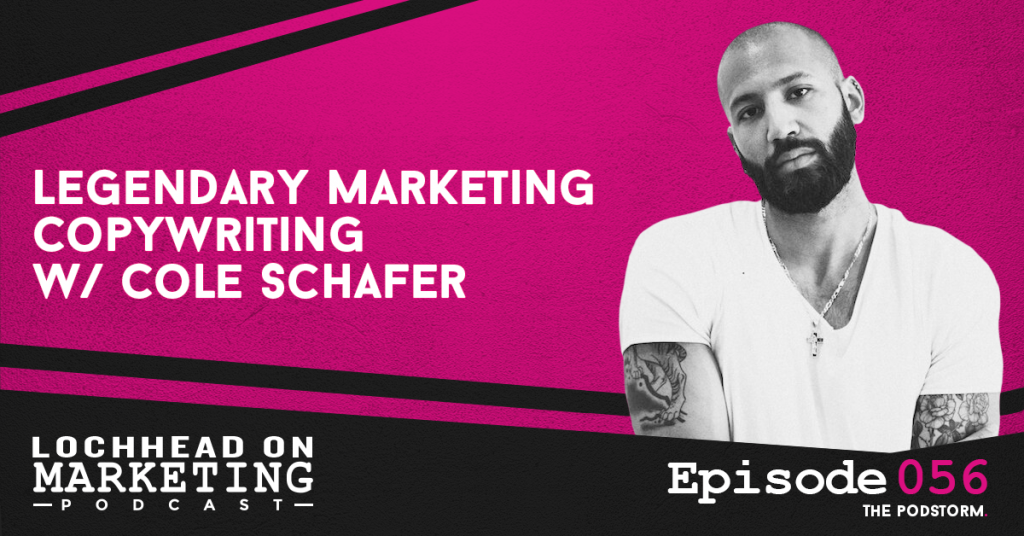
Podcast (lochheadonmarketing): Play in new window | Download (Duration: 24:42 — 17.0MB) | Embed
Subscribe: Apple Podcasts | Spotify | RSS | More
Today, in this very special episode, we’re going to go deep on one of the seminal, most powerful marketing skills there is — copywriting. To discuss more, we have the OG of copywriting, Cole Schaefer of Honeycopy.com. Pay special attention to a particular legendary idea that Cole shares about how you can use your favorite book or books to transform your own writing.
Marketers Should Be Writers
Cole believes all marketers should also be writers. He believes this is of prime importance if you want to reach a wider audience. If more marketers would focus on writing, the messages will be a lot more clear, crisp and ultimately, customers will comprehend messages better.
“The vast majority of business writing and marketing communication, to be honest, it’s just really, really tough to read. I would say primarily because it’s just littered with sort of business jargon and buzzwords. I hate to say but kind of like the showboating is what I feel like when I read a lot of brand writing and it doesn’t feel that it can be understood by the wider audience.” – Cole Schafer
Writing in Third-Person POV
Another observation Cole shares is: brands write on a third-person point of view. Whether it is on their website or other communications, Cole says the rationale behind is the mentality of not being pompous.
“I think for us, any brand, be it big or small, the goal is for when someone sits down and reads their emails or their website, coffee or anything, we really want to feel like we’re talking to another human being. Right?” – Cole Schafer
Become A Legendary Writer
Cole gives out valuable copywriting advice for marketers or even aspiring writers. From knowing your voice and your audience to rewriting ads just like how David Ogilvy does it, Cole gives a rundown on his personal processes.
“I would tell people if whether it’s writing or podcasting or whatever, whatever craft you’re trying to do, just absorb really really, really good art in that specific field. If you want to become a great writer, don’t read bad writing. Pick up a really good book, look up the best writers of all time, start reading there and I think naturally it will imprint on your brain.” – Cole Schafer
To know more about Cole and how to become a legendary copywriter, download and listen to this episode.
Bio:
Cole Schafer likes to live fast, write often, and pet dogs.
He is a thinker, marketer, and writer that has been published in Business Insider, Entrepreneur Magazine, The Mission, Thought Catalog, and P.S. I Love You.
In addition, Cole is the Founder & Copy Chief at Honey Copy, a creative copywriting agency that helps big brands write valuable “stuff” that people actually want to read.
Links:
We hope you enjoyed this episode of Lochhead on Marketing™! Christopher loves hearing from his listeners. Feel free to email him, connect on Facebook, Twitter, Instagram, and subscribe on iTunes! You may also subscribe to his newsletter, The Difference, for some amazing content.
055 How To Fight Injustice w/ Legendary Marketing | Marketing PodStorm 17
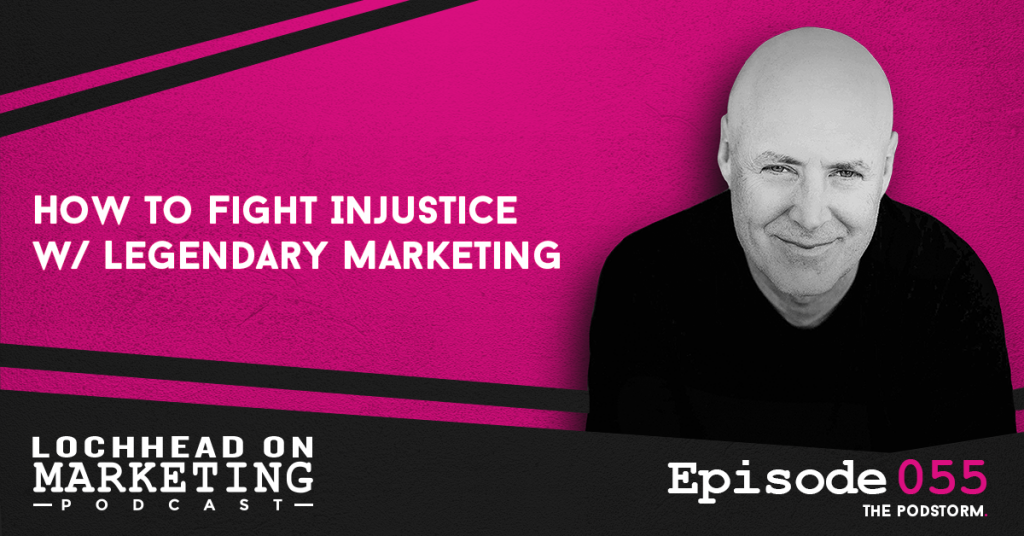
Podcast (lochheadonmarketing): Play in new window | Download (Duration: 14:08 — 9.7MB) | Embed
Subscribe: Apple Podcasts | Spotify | RSS | More
Today, let’s take a look at the role of marketing in driving real, dramatic, impactful, important social change. We dig into topics like the battle against AIDS, the women’s movement, and even the founding of the United States of America as actual acts of legendary marketing, and what you might think of as category design.
It moves the world
Christopher believes that legendary marketing does more than just drive sales. Legendary marketing does more. Marketing a provocative point of view creates a new category of social fabric that drives real societal change
“I would argue to you that the greatest marketers, the most legendary marketers are actually category designers. They introduced the world to new ways of thinking, playing, and working and for major societal change to happen. It requires new categories of thinking, what you might think of as very different points of view, points of view that move the world from the way it is today, to the way we want it to be.” – Christopher Lochhead
More on Societal Change
From spreading awareness about AIDS, to equality wage for equal work, to the establishment of the United States of America, Christopher carefully breaks down why these are provocative points of view that later on demanded societal changes.
He reads several quotes lifted from the actual Declaration of Independence and touches on self-governance, which is timely at the moment of recording, where there is civil unrest in the US because of the untimely death of African American George Floyd.
Designing The World of Your Choosing
As Christopher believes this is a cocoon time, a time in between pre-Covid19 and post Covid19, he poses a question on what kind of world we would like to design?
“So what am I saying to you? Whether it’s a legendary entrepreneur, artist, or social change agent? The question facing all of us in the United States, particularly and frankly, around the world, is what kind of country and what kind of world do we want to design now?” – Christopher Lochhead
Ultimately, for exponential change to happen, it requires category design. It requires the marketing of a point of view that mobilizes a movement to take the world to an exponentially different future. This is why Christopher thinks a real social change requires category design and legendary marketing predicated on a powerful and different point of view.
Bio:
Christopher Lochhead is a #1 Apple podcaster and #1 Amazon bestselling co-author of books: Niche Down and Play Bigger.
He has been an advisor to over 50 venture-backed startups; a former three-time Silicon Valley public company CMO and an entrepreneur.
Furthermore, he has been called “one of the best minds in marketing” by The Marketing Journal, a “Human Exclamation Point” by Fast Company, a “quasar” by NBA legend Bill Walton and “off-putting to some” by The Economist.
In addition, he served as a chief marketing officer of software juggernaut Mercury Interactive. Hewlett-Packard acquired the company in 2006, for $4.5 billion.
He also co-founded the marketing consulting firm LOCHHEAD; was the founding CMO of Internet consulting firm Scient, and served as head of marketing at the CRM software firm Vantive.
Links:
African Americans are incarcerated more than 5 times the rate of white people
From Kenneth Cole, a New Solidarity
We hope you enjoyed this episode of Lochhead on Marketing™! Christopher loves hearing from his listeners. Feel free to email him, connect on Facebook, Twitter, Instagram, and subscribe on iTunes! You may also subscribe to his newsletter, The Difference, for some amazing content.
054 Why You Need A Big Hairy Audacious Goal | Marketing PodStorm 16
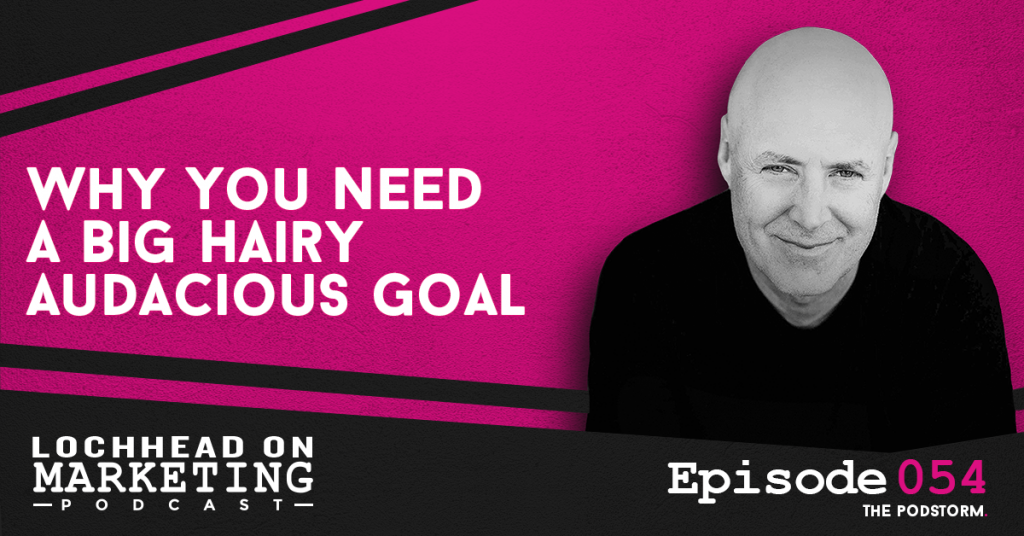
Podcast (lochheadonmarketing): Play in new window | Download (Duration: 9:58 — 6.8MB) | Embed
Subscribe: Apple Podcasts | Spotify | RSS | More
We are hoping you read Jim Collins two legendary books Built to Last and Good to Great. These are game-changers with insanely great research about businesses. In those books, he introduces the concept of a BHAG, which is an acronym for big, hairy, audacious goal. In this episode, let’s talk about why you need, what legendary author Jim Collins calls, a big, hairy, audacious goal.
Man On The Moon Mission
One of the greatest examples of a BHAG is when John F. Kennedy said: USA is going to put a man on the moon within the decade. It is specific, clear, and clearly big and hairy, audacious at the time. Moreover, it is complete since it has time on it.
“Why does this matter in the context of marketing, in particular, in the context of a category design approach for designing and dominating market category? Well, the first part of achieving the goal is to declare it. When you tie a BHAG to a category design strategy, something amazing happens.” – Christopher Lochhead
Microsoft’s BHAG
One of the most powerful examples in the tech industry was Microsoft when they were building the personal computer category. They had a BHAG when they called a computer, a PC on every desktop.
“Number one, PC on every desktop is very clear. Number two, by doing that, Microsoft is declaring themselves the category queen because there’s an interesting thing, in the minds of the market, in the minds of people, the company evangelizing the category must be the leader or category queen or king in that category. Microsoft, in this case, is evangelizing what they want to happen.” – Christopher Lochhead
Are you part of the 10%?
At the beginning of this PodStorm, episode number 39, Christopher shared that approximately 10% of companies get stronger in a downturn. Now, he encourages you to adopt that as a possible goal for your company.
“By declaring your BHAG, and making it clear to your people, your prospects, your customers, your investors, and — this one I actually love the most — your competitors, all of a sudden you’ve planted your flag on something. It becomes very unifying, very focusing. and it motivates your people. Hopefully, it inspires your customers, investors, and partners, and it scares the shit out of your competition. And to me, legendary marketing does all of that.” – Christopher Lochhead
To know more about Christopher and how why you need a BHAG for your company, download and listen to this episode.
Bio:
Christopher Lochhead is a #1 Apple podcaster and #1 Amazon bestselling co-author of books: Niche Down and Play Bigger.
He has been an advisor to over 50 venture-backed startups; a former three-time Silicon Valley public company CMO and an entrepreneur.
Furthermore, he has been called “one of the best minds in marketing” by The Marketing Journal, a “Human Exclamation Point” by Fast Company, a “quasar” by NBA legend Bill Walton and “off-putting to some” by The Economist.
In addition, he served as a chief marketing officer of software juggernaut Mercury Interactive. Hewlett-Packard acquired the company in 2006, for $4.5 billion.
He also co-founded the marketing consulting firm LOCHHEAD; was the founding CMO of Internet consulting firm Scient, and served as head of marketing at the CRM software firm Vantive.
Links:
We hope you enjoyed this episode of Lochhead on Marketing™! Christopher loves hearing from his listeners. Feel free to email him, connect on Facebook, Twitter, Instagram, and subscribe on iTunes! You may also subscribe to his newsletter, The Difference, for some amazing content.
053 Little Marketing Ideas, Legendary Results | Marketing PodStorm 15
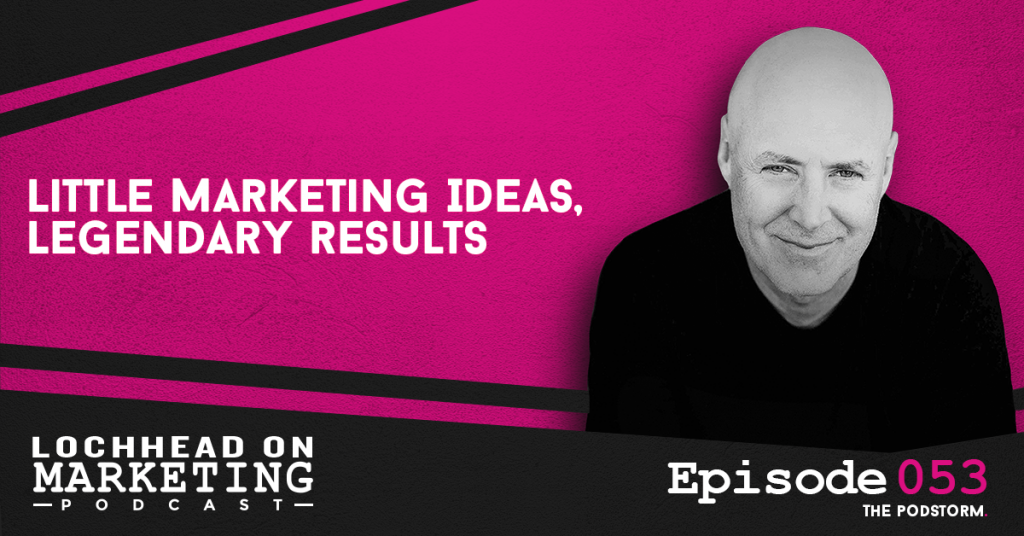
Podcast (lochheadonmarketing): Play in new window | Download (Duration: 9:38 — 6.6MB) | Embed
Subscribe: Apple Podcasts | Spotify | RSS | More
In this episode of the PodStorm, let’s talk about some little marketing ideas that can produce legendary results. Christopher shares two stories to depict this: the first, about how legendary guitar brand Fender got 500,000 emails almost overnight during the pandemic, and how Colgate got kids to brush their teeth with ice cream.
Fender Got 500,000 Emails During C19
Christopher narrates stories from his friend and copywriter Cole Shaefer of Honeycopy.com about Fender, a legendary guitar company that makes guitars and amps and other various musical equipment. Recently, they proved that radical generosity and thoughtfully aggressive can produce legendary results.
“You need to manufacture guitar players because there ain’t no guitar-buying if there ain’t no guitar players. So what Fender has done over time is they transform themselves from a hardware company into a software company. In doing so, they built their own data flywheel.” – Christopher Lochhead
The hardware company set up a software platform called Fender Play, designed to teach people to play guitar. Listen to the episode to find out what else happened when Fender decided to give access to its software, for free.
Don’t Forget About Colgate
Another story Cole Schaffer told Christopher happened way back in 2009. Colgate was devising of marketing efforts to get kinds onboard with the whole “brush your teeth twice a day” movement.
“Imagine you’re the CEO or the CMO of Colgate, and you’re trying to get kids to brush their teeth. What’s the opposite of what most people would do? Well, give them ice cream, but that’s exactly what Colgate did. So imagine instead of a generic stick inside, it’s a stick that looks a lot like a toothbrush. It’s in the shape of a toothbrush. It’s a wooden Ice cream stick in the shape of a toothbrush with a copy on it that says, ‘Don’t forget’, and Colgate started handing out Ice cream, ice cream bars to kids.” – Christopher Lochhead
Key Takeaway
These are both legendary examples of simple ideas that are very thoughtfully aggressive and radically generous at the same time. So how might that apply to your business?
“Think small, think simple, think cheap, sometimes not having much of a budget drives creativity. And ask yourself what is an insanely simple, cheap, thoughtfully aggressive, radically generous idea that we could pull off fast and then go do that?” – Christopher Lochhead
To hear more about how to devise little marketing ideas with legendary results, download and listen to this episode.
Bio:
Christopher Lochhead is a #1 Apple podcaster and #1 Amazon bestselling co-author of books: Niche Down and Play Bigger.
He has been an advisor to over 50 venture-backed startups; a former three-time Silicon Valley public company CMO and an entrepreneur.
Furthermore, he has been called “one of the best minds in marketing” by The Marketing Journal, a “Human Exclamation Point” by Fast Company, a “quasar” by NBA legend Bill Walton and “off-putting to some” by The Economist.
In addition, he served as a chief marketing officer of software juggernaut Mercury Interactive. Hewlett-Packard acquired the company in 2006, for $4.5 billion.
He also co-founded the marketing consulting firm LOCHHEAD; was the founding CMO of Internet consulting firm Scient, and served as head of marketing at the CRM software firm Vantive.
Links:
Fender wants to teach you guitar (for free) during quarantine
How Colgate reminded kids to brush their teeth by feeding them ice cream
024 The Difference Between a First Mover and a Category Creator w/ Eddie Yoon
We hope you enjoyed this episode of Lochhead on Marketing™! Christopher loves hearing from his listeners. Feel free to email him, connect on Facebook, Twitter, Instagram and subscribe on iTunes! You may also subscribe to his newsletter, The Difference, for some amazing content.
052 Questions and Cocktails: FB Live Q & A (Part 4) | Marketing PodStorm 14
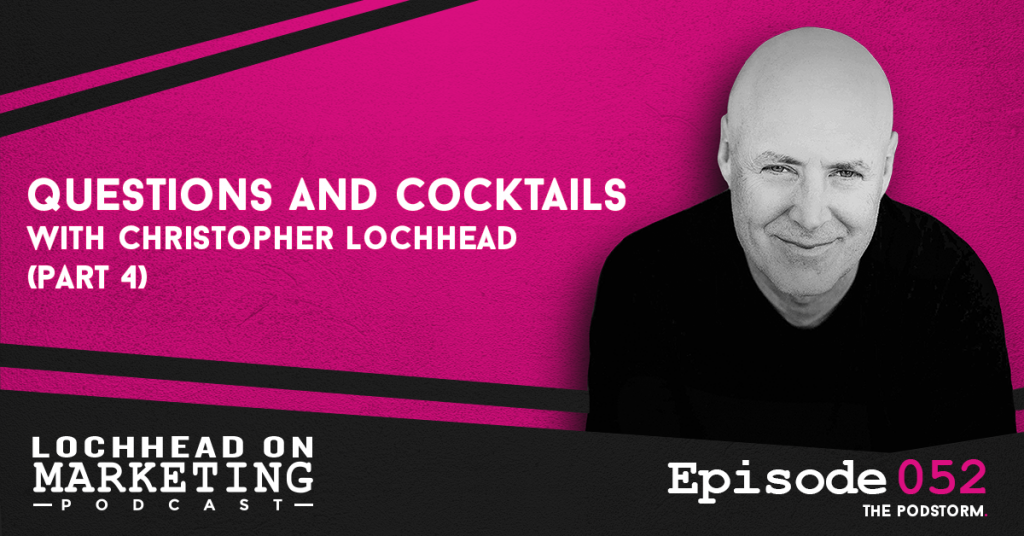
Podcast (lochheadonmarketing): Play in new window | Download (Duration: 18:35 — 12.8MB) | Embed
Subscribe: Apple Podcasts | Spotify | RSS | More
During the PodStorm, we’re doing a live Facebook Question and Answer session, every Friday, 11:30 a.m. PST. We did our first and second one last week. We’re going to share with you our fourth part of the Q&A session in this episode. Today, podcast living legend Jason DeFillippo of Grumpy Old Geeks joins us to answer some questions about lightning strikes, taglines, how to launch a new category, and much more.
How long does a Lightning Strike Last?
Christopher answers this question about marketing lightning strikes: it ranges from a day to a week. He further says that this is a challenge of either rising above the noise or being part of the noise. During a lightning strike, you try to stand out and become undeniable to your target audience
“The key tenants of a lightning strike are maximum impact in minimum time. It’s predicated on the premise that you can’t peanut butter, your marketing, right.” – Christopher Lochhead
How do we come up with a tagline?
Christopher and Jason converses nicely about coming up with a powerful tagline. Christopher says the Grumpy Old Geeks have one of the best taglines in over the web: “What went wrong on the internet and who’s to blame?” Christopher gives out other examples in this episode.
“The vast majority of taglines are complete bullshit. The reason they’re bullshit is: they’re some meaningless thing. Most importantly, they do not tie often to the brand. Category and legendary taglines are representative of a point of view, centered around the category.” – Christopher Lochhead
When is a good time to launch a new category?
Christopher gives out a few examples of companies that successfully launched their categories, such as Zoom. Jason chides in with a few more examples such as Reddit. Ultimately, what is worthy to take note are the megatrends that you could take advantage of to build a new category.
“I think it would be silly not to acknowledge the importance of timing, and to some degree, the importance of luck.” – Christopher Lochhead
To hear more about the Facebook Live Q&A with Christopher Lochhead, with Jason DeFillippo, download and listen to this episode.
Bio:
Christopher Lochhead is a #1 Apple podcaster and #1 Amazon bestselling co-author of books: Niche Down and Play Bigger.
He has been an advisor to over 50 venture-backed startups; a former three-time Silicon Valley public company CMO and an entrepreneur.
Furthermore, he has been called “one of the best minds in marketing” by The Marketing Journal, a “Human Exclamation Point” by Fast Company, a “quasar” by NBA legend Bill Walton and “off-putting to some” by The Economist.
In addition, he served as a chief marketing officer of software juggernaut Mercury Interactive. Hewlett-Packard acquired the company in 2006, for $4.5 billion.
He also co-founded the marketing consulting firm LOCHHEAD; was the founding CMO of Internet consulting firm Scient, and served as head of marketing at the CRM software firm Vantive.
We hope you enjoyed this episode of Lochhead on Marketing™! Christopher loves hearing from his listeners. Feel free to email him, connect on Facebook, Twitter, Instagram and subscribe on iTunes! You may also subscribe to his newsletter, The Difference, for some amazing content.
050 How to Discover a New Category| Marketing PodStorm #12
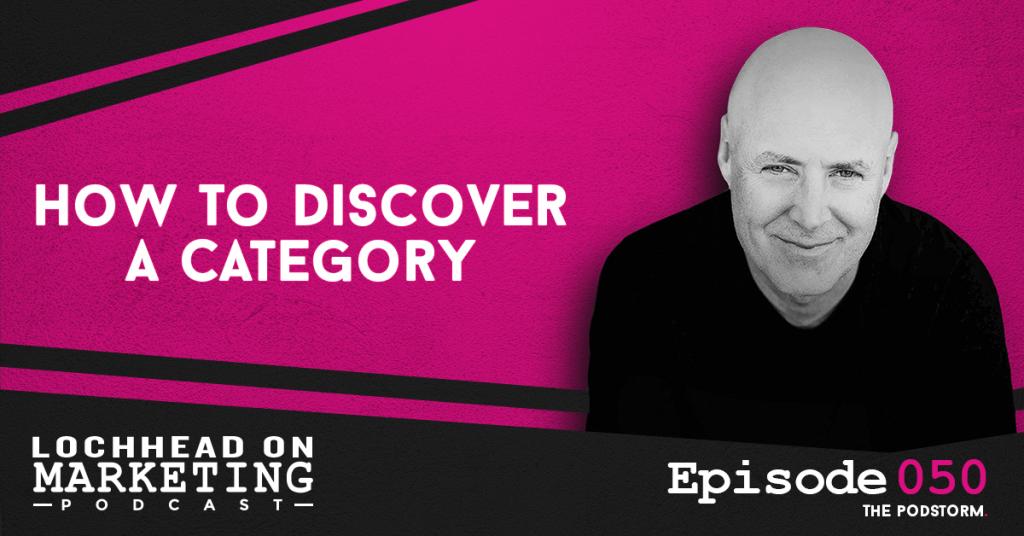
Podcast (lochheadonmarketing): Play in new window | Download (Duration: 8:29 — 5.8MB) | Embed
Subscribe: Apple Podcasts | Spotify | RSS | More
In this episode of the PodStorm. let’s talk about how to discover a category, create massive differentiation, and build a super valuable company, particularly in challenging times.
Designed, Not Discovered
Christopher gets all sorts of questions such as “how do I know if I have a category?” “I think I might have something, how do I discover a category?” “How do I know if this is a new category?” “How do I redesign an existing category, etc.” The first thing Christopher shares to us is: categories are not discovered.
“They are created, they are designed and legendary entrepreneurs, legendary marketers, legendary innovators, teach the world how to see things the way they do. And so that category is not discovered like a new piece of land. It’s created, you’re bringing something new forward.” – Christopher Lochhead
Future of Our Choosing
Christopher points out that designing a market category is like choosing the future. Legendary marketers are like visitors from the future, moving the market into a certain point of view they choose, in order to solve a certain problem,
“The first thing I’d point you to, is, what is it the insight that you’re differentiating on? What’s what we call missing in the market category that you see? And sometimes that missing is giant, we discover some kind of plutonium of sorts.” – Christopher Lochhead
Technical and Market Insights
In the book Play Bigger, Christopher wrote about his learnings from Anne Miura-ko, Co-founder of Floodgate Capital. He gives out examples to identify and differentiate the types of insights.
“What Anne says essentially is that there are two kinds of insight: there’s a market insight where you see a missing in a market and there’s a technical or innovation insight.” – Christopher Lochhead
After identifying what kind of insight you have, Christopher advises that you must be able to explain the problem you are solving to a three-year-old.
“Because clarity of focus, clarity of thinking, clarity of language, is critical if you’re going to do pretty much anything legendary.” — Christopher Lochhead
To know more about how to discover and design a category, download and listen to this episode.
Bio:
Christopher Lochhead is a #1 Apple podcaster and #1 Amazon bestselling co-author of books: Niche Down and Play Bigger.
He has been an advisor to over 50 venture-backed startups; a former three-time Silicon Valley public company CMO and an entrepreneur.
Furthermore, he has been called “one of the best minds in marketing” by The Marketing Journal, a “Human Exclamation Point” by Fast Company, a “quasar” by NBA legend Bill Walton and “off-putting to some” by The Economist.
In addition, he served as a chief marketing officer of software juggernaut Mercury Interactive. Hewlett-Packard acquired the company in 2006, for $4.5 billion.
He also co-founded the marketing consulting firm LOCHHEAD; was the founding CMO of Internet consulting firm Scient, and served as head of marketing at the CRM software firm Vantive.
We hope you enjoyed this episode of Lochhead on Marketing™! Christopher loves hearing from his listeners. Feel free to email him, connect on Facebook, Twitter, Instagram, and subscribe on iTunes! You may also subscribe to his newsletter, The Difference, for some amazing content.
049 Do A Marketing Stunt | Marketing PodStorm #11
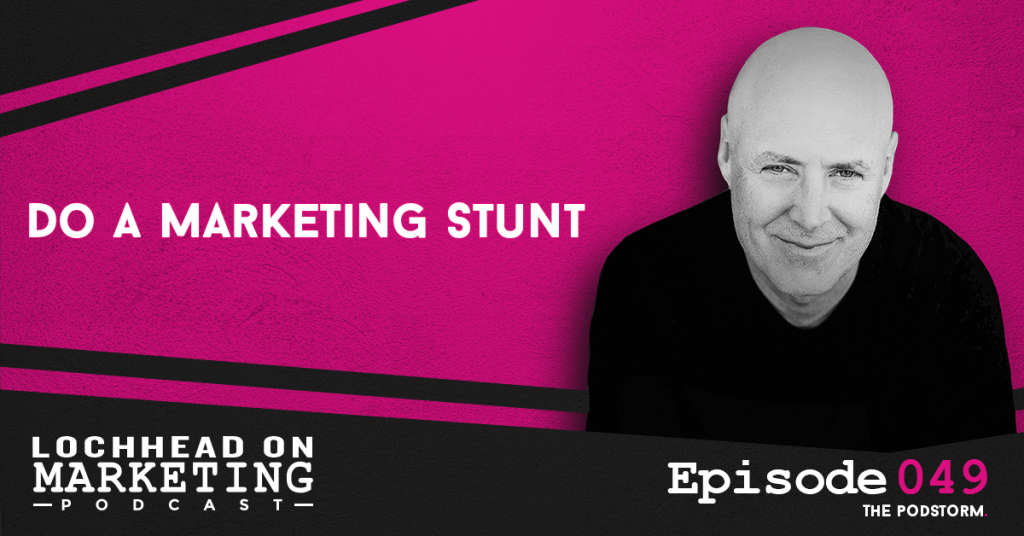
Podcast (lochheadonmarketing): Play in new window | Download (Duration: 8:23 — 5.8MB) | Embed
Subscribe: Apple Podcasts | Spotify | RSS | More
In this episode, let’s talk about the power of a well-timed stunt to gain attention, rise above the noise, and drive revenue. This is how we get our creative juices flowing. Do something that is maybe a little provocative, maybe a little risque. It should be designed to get a lot of attention, and maybe even drive some PR.
Black Friday Sale, Not!
Christopher shares about different brands and their provocative stunts. Max Temkin, founder of the Cards Against Humanity appeared on Follow Your Different Episode 60. Max and his team probably are the masters in terms of marketing stunts when they jacked up their prices, on Black Friday Sale.
“As a way of sort of doing the opposite of what every B2C company and brand does — and as a way of sort of calling bs on consumerism — they increased the price of Cards Against Humanity on Black Friday, and got a ton of PR for it. People thought it was hysterical. They paid the price. They stood out.” – Christopher Lochhead
Sponsoring The Golden Gate Bridge
CarsDirect.Com also pulled off one legendary stunt when they sent out press releases about their proposal to sponsor the Golden Gate Bridge. This press release stirred up a lot of controversies and reaction from the media, but they still ended up getting a lot of publicity for it.
“Now notice, they put forward a proposal, it wasn’t actually happening. By putting that press release out, they caused a tremendous amount of controversy.” – Christopher Lochhead
Aliens Will Eat Fat People First
Another marketing stunt that got into a lot of controversies is the Ad of 24 Hour Fitness featuring an alien and caption that says, “when they come, they’ll eat the fat ones first.”
“Their CEO is interviewed on the news. And he was talking about how they’re just trying to have fun and shine a light on obesity and that people need to get fit and healthy and the like. And a lot of people were upset and there was all this kerfuffle again, but what were they talking about? 24 Hour Fitness.” – Christopher Lochhead
Christopher encourages companies to be provocative, be thoughtful be potentially willing to piss some people off (depending on your brand).
To hear more about doing a marketing stunt, download and listen to this episode.
Bio:
Christopher Lochhead is a #1 Apple podcaster and #1 Amazon bestselling co-author of books: Niche Down and Play Bigger.
He has been an advisor to over 50 venture-backed startups; a former three-time Silicon Valley public company CMO and an entrepreneur.
Furthermore, he has been called “one of the best minds in marketing” by The Marketing Journal, a “Human Exclamation Point” by Fast Company, a “quasar” by NBA legend Bill Walton and “off-putting to some” by The Economist.
In addition, he served as a chief marketing officer of software juggernaut Mercury Interactive. Hewlett-Packard acquired the company in 2006, for $4.5 billion.
He also co-founded the marketing consulting firm LOCHHEAD; was the founding CMO of Internet consulting firm Scient, and served as head of marketing at the CRM software firm Vantive.
Links:
Follow Your Different Episode 60 – Max Temkin
Times Cards Against Humanity Pulled Amazing Publicity Stunts
Our Favorite Crazy Stunts From Salesforce Leader Marc Benioff
WKRP In Cincinnati – Turkey Drop Scene
We hope you enjoyed this episode of Lochhead on Marketing™! Christopher loves hearing from his listeners. Feel free to email him, connect on Facebook, Twitter, Instagram, and subscribe on iTunes! You may also subscribe to his newsletter, The Difference, for some amazing content.
048 How to Market with a Powerful Point of View | Marketing PodStorm #10
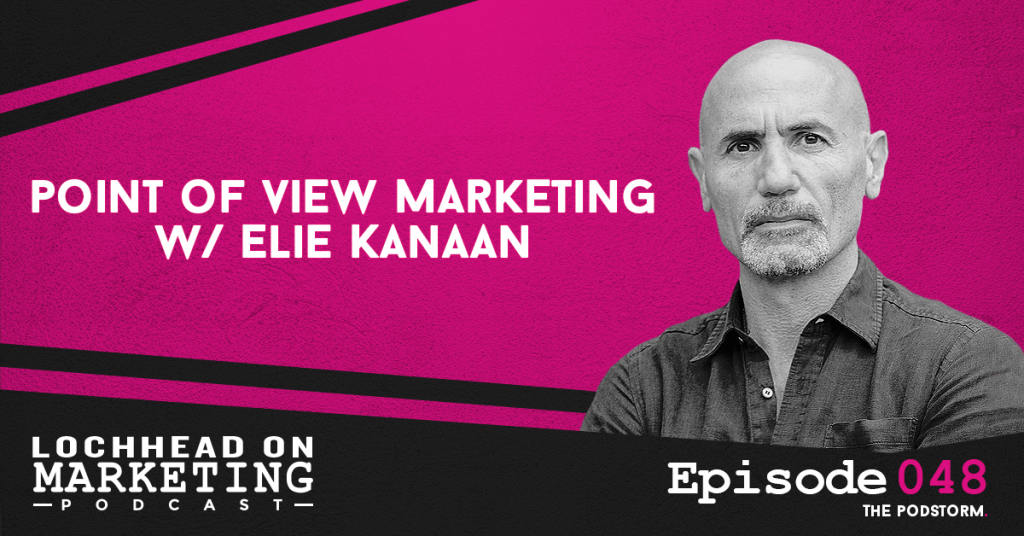
Podcast (lochheadonmarketing): Play in new window | Download (Duration: 31:53 — 21.9MB) | Embed
Subscribe: Apple Podcasts | Spotify | RSS | More
In today’s PodStorm episode, let’s go deep on how to market with a powerful point of view. POVs can be viewed as a mechanism for distinguishing your brand and most importantly, to design and dominate your market category. As wacky as it might sound, downturns can be very powerful times to do exactly that.
To discuss this in more detail, we invited Elie Kanaan. He is one of the most talented CMOS and category designers, who now works as the Head of Marketing for Ogury Europe.
One Big Challenge
Eli believes marketing a provocative POV is one of the biggest challenges any leader faces. Aside from marketing a POV, you must also know how to turn that POV into results. He says that a powerful POV starts with the CEO and CMOs should be fully supportive of it.
“I believe there are three different journeys that need to happen within the company that is led by the standard CEO, CMO. First, there’s a product transformation journey. Then, there’s a marketing transformation journey and there is a sales transformation journey. So for that, the CEO and the CMO needs to get on board, the Chief Product Officer, the Chief Technology Officer, and the Chief Revenue Officer. So those would be secondary, but equally important when it comes to execution.” – Elie Kanaan
Bringing Everyone Onboard
In presenting a POV, you need to do remember that everyone must believe and understand, your idea with bring good money to the company. Once this is defined, everybody on the board sees the light aka your powerful POV.
Aside from this, a POV becomes a strategy for the whole company and not some mere marketing message or tactic that you employ for a limited time period. A POV is a fixed lens where a company looks into a problem.
“When we declare a point of view, and we’re evangelizing a problem, that’s something that doesn’t really change. That’s it. That’s a vision, right? This distinction between a point of view that really points to a true north North, ‘what’s the mission’ or on ‘what’s the problem we’re solving?’ ‘Why should customers care’ ‘Why is this thing a new opportunity’ ‘Why is this thing, a new way of thinking about something that’s gonna make a difference for customers?’ As opposed to a message called, ‘hey, this month only buy one, get one free, right?’ That’s a message.” – Christopher Lochhead
Different Is Non-Negotiable
The next thing to do is: you have to convince everyone that your idea is different. Unique is different and hard to copy, but oftentimes, leaders confuse being different to what Eli and Christopher call as a “better drop.”
“Our minds have been molded into having a better conversation all the time because of alI the shitty marketing that happened before. I mean, there’s some good marketing that happened, but a lot of the marketing is better. This is one of the biggest pitfalls in creating the category — either on the marketing side or the product or the sales side. The Product Team wants to do better products, the Sales want to sell better features, Marketing have better value propositions. /you know, we always set it together actually, is that better is negotiable. Different isn’t.” – Elie Kanaan
To learn more about how to market a powerful and provocative point of view, download and listen to this episode.
Bio:
Elie, is an engineering mind coupled with a passion for human psychology. His life, career and interests have been a direct consequence of these two attributes.
After graduating from Stanford University with a Master in Computer Sciences, he started his career as a developer at Oracle, when Oracle was a small company.
Quickly he realized that his calling was in creating and building market categories, mostly with category kings: Client/Server Database (Oracle/Sybase), Business Technology Optimisation (Mercury), Business Intelligence (Business Objects), Enterprise Resource Planning (SAP), and Virtualization (VMware).
Elie is now working as a CMO for Ogury, helping them design their category and dominate it.
On a more personal level, Elie was born in Ivory Coast in Africa, grew up in Lebanon, studied and worked in California, married with an Ukrainian woman, lived in Belgium, and now living in Paris, with the loves of his life, his wife Vlada and their three sons, Ezekiel, Eyal, and Eliya.
Elie is a philosopher at heart. He has a deep and meaningful quote or story for every situation drawn from his multi-cultural background and household.
Links:
We hope you enjoyed this episode of Lochhead on Marketing™! Christopher loves hearing from his listeners. Feel free to email him, connect on Facebook, Twitter, Instagram, and subscribe on iTunes! You may also subscribe to his newsletter, The Difference, for some amazing content
045 Questions and Cocktails: Facebook Live Q & A (Part 2) | Marketing PodStorm #7
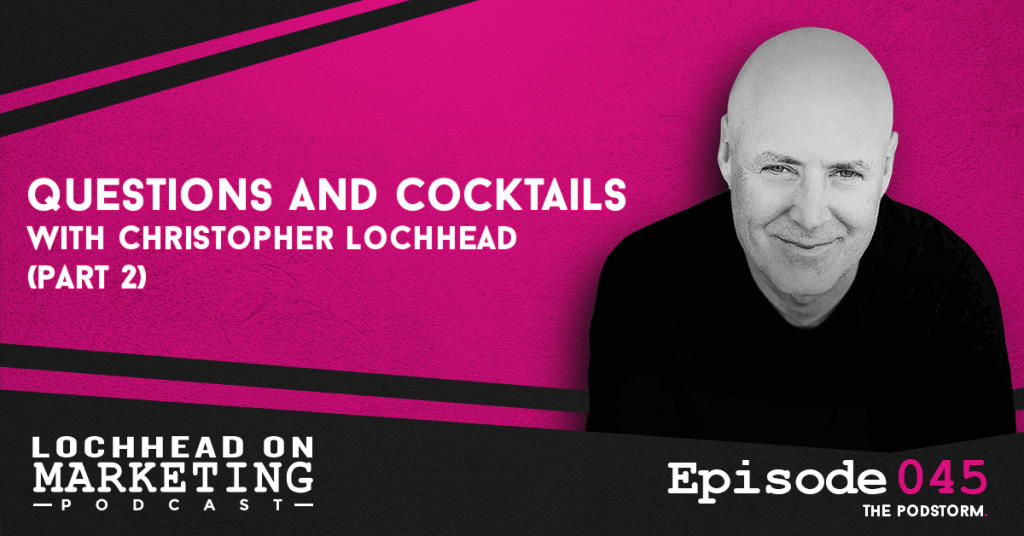
Podcast (lochheadonmarketing): Play in new window | Download (Duration: 21:45 — 14.9MB) | Embed
Subscribe: Apple Podcasts | Spotify | RSS | More
During the PodStorm, were doing a live Facebook Question and Answer session, every Friday, 11:30 a.m. PST. Here is the second part of our recording, for Q&A about marketing and category design. We talk about all things ranging from new category creation, how to craft problems positively, and creating demand during a crisis.
How to know if you have a new category?
As counterintuitive as it might sound, now is a great time to launch a new category. Christopher encourages you to ask yourself a couple of key questions: number 1, “what problem do I solve?” or “do I solve that in a different or unique way?” and “What kind of market insights do you have?” If you don’t think of it as a problem, maybe you create an opportunity.
“Nobody buys a solution unless they see a problem. You might consider asking what kind of insights do you have. One is technical insight. Somebody creates a new algorithm or somebody creates hardware. Another one is Market Insight, for example, ‘I want to be able to hire somebody to do an odd job, takes something from point a to point b, come over and help me with something.’ Do you have a technical insight or do you have a market insight? Regardless of what it is, begin to evangelize that insight, that difference.” – Christopher Lochhead
How do you talk about problems in a positive way?
Evangelizing a problem in a positive way can lead to mass differentiation and category creation. Christopher advises legendary marketers to frame the problem as deeply relatable. This way, we want to be seen as a hero, mobilizing people to come together to solve said problem.
“Here’s what I’ve learned, what you want to do in the way you talk about problems is, do it such that you create ‘us.’ You make the problem an enemy, a ‘them.’ You want to define the problem very powerfully, in a way that resonates with people, and then you say, this aggression will not stand, man.” – Christopher Lochhead
How do you create demand in a situation where your revenue is dropping?
Christopher chides that this is one tough question. We know many companies are having this problem. He drops a bunch of ideas that although might not exactly answer this question, but hopefully might stimulate some thinking.
“The first idea, take a handful of your smartest people and lock them and brainstorm 3-5 things that you go near term to stimulate revenue. If you are in the B2B space, create a white space analysis. What you do, you take your existing customer base, do a quick analysis to find out which of your products and services they are currently using. Once you know what they are using, then you immediately target existing customers. If you’re in the B2C, be visible in your neighborhood.” – Christopher Lochhead
To hear more about the Facebook live Q&A session (Part 2) with Christopher Lochhead, download and listen to this episode.
Bio:
Christopher Lochhead is a #1 Apple podcaster and #1 Amazon bestselling co-author of books: Niche Down and Play Bigger.
He has been an advisor to over 50 venture-backed startups; a former three-time Silicon Valley public company CMO and an entrepreneur.
Furthermore, he has been called “one of the best minds in marketing” by The Marketing Journal, a “Human Exclamation Point” by Fast Company, a “quasar” by NBA legend Bill Walton and “off-putting to some” by The Economist.
In addition, he served as a chief marketing officer of software juggernaut Mercury Interactive. Hewlett-Packard acquired the company in 2006, for $4.5 billion.
He also co-founded the marketing consulting firm LOCHHEAD; was the founding CMO of Internet consulting firm Scient, and served as head of marketing at the CRM software firm Vantive.
We hope you enjoyed this episode of Lochhead on Marketing™! Christopher loves hearing from his listeners. Feel free to email him, connect on Facebook, Twitter, Instagram and subscribe on iTunes! You may also subscribe to his newsletter, The Difference, for some amazing content.

